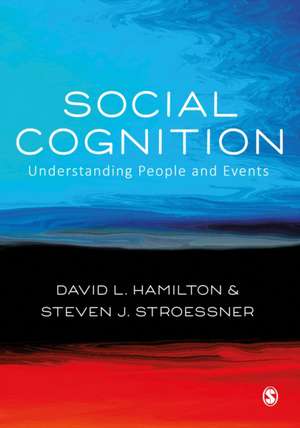Social Cognition: Understanding People and Events
Autor David L. Hamilton, Steven N. Stroessneren Limba Engleză Paperback – 23 noi 2020
The authors will guide your students, using examples and up-to-date studies, through this approach; from explaining the processes themselves right through to demonstrating the role cognitive processes play in our social lives.
With chapters on the following processes:
· Memory
· Judgement
· Attention
· Attribution
· Evaluation
· Automatic processing.
This book will provide your students with a framework for understanding the most common areas of interest for Social Cognition, such as perception, attitudes and stereotyping.
Preț: 376.03 lei
Preț vechi: 482.09 lei
-22% Nou
71.95€ • 78.40$ • 60.63£
Carte disponibilă
Livrare economică 02-16 aprilie
Livrare express 19-25 martie pentru 63.97 lei
Specificații
ISBN-10: 1412935547
Pagini: 672
Dimensiuni: 195 x 265 x 39 mm
Greutate: 1.46 kg
Ediția:First Edition
Editura: SAGE Publications
Colecția Sage Publications Ltd
Locul publicării:London, United Kingdom
Recenzii
Although I am retired and no longer teaching at the university level, I read this new textbook on Social Cognition because of my long-standing interest in the social cognition literature in social psychology. I was not disappointed. The book is not only an excellent text but a scholarly achievement in its own right. The unique structure of the chapters provides an effective structure for coverage that is both comprehensive and comprehendible. Unlike many texts in this area that read like encyclopedia entries, the organization of this book provides a more narrative structure that facilitates understanding of a wide-ranging and complex research literature. I particularly liked the novel chapter on the Time dimension that covered some fascinating work on perception of time, change across time, and anticipating the future.
Overall, I learned a lot from this book that was new to me and also came to see some familiar research in a new light.
Cuprins
Chapter 2: Cognitive Representations: Structures of the Mind
Chapter 3: Automatic Processing: Doing More Than We Know
Chapter 4: Attention: The Mind’s Eye Meets the Social World
Chapter 5: Interpretation: Making Meaning
Chapter 6: Evaluation: Judging Good and Bad
Chapter 7: Inference: Going Beyond the Obvious
Chapter 8: Attribution: Understanding Why Things Happen
Chapter 9: Judgment: Reasoning and Decision Making
Chapter 10: Memory: Storage and Retrieval
Chapter 11: The Time Dimension: Understanding the Past, Anticipating the Future
Chapter 12: Social Cognition and Action: Thinking and Doing
Notă biografică
David L. Hamilton received his Ph.D. from the University of Illinois. He was on the faculty at Yale University for eight years before moving to the University of California, Santa Barbara. He has published extensively on topics in social perception, including stereotyping, impression formation, person memory, and perceptions of groups. He has served on numerous committees in professional organizations, including the Executive Committees of the Society of Personality and Social Psychology and the Society of Experimental Social Psychology, and for 25 years was co-organizer of the annual Person Memory Interest Group meetings. He has been associate editor of two journals and has served on several editorial boards. He received the MERIT Award from the National Institute of Mental Health in 1987. He has been awarded honorary degrees from two European universities, the University of Lisbon, Portugal (1997) and Eotvos Lorand University in Budapest, Hungary (2000). In 2000 he received the Thomas M. Ostrom Award, presented by the Person Memory Interest Group, for "outstanding contributions to social cognition," and in 2008 received the Jean-Claude Codol Award from the European Association of Social Psychology for "contributions to the advancement of social psychology in Europe." In 2014 he received the Distinguished Alumni Award from his alma mater, Gettysburg College.
